Morris K. Udall: Reflections on his Impact for the Southwest
A UArizona History Doctoral Student reflects on the Udall Center's commemoration of Morris K. Udall on what would have been the lawmaker's 100th birthday.
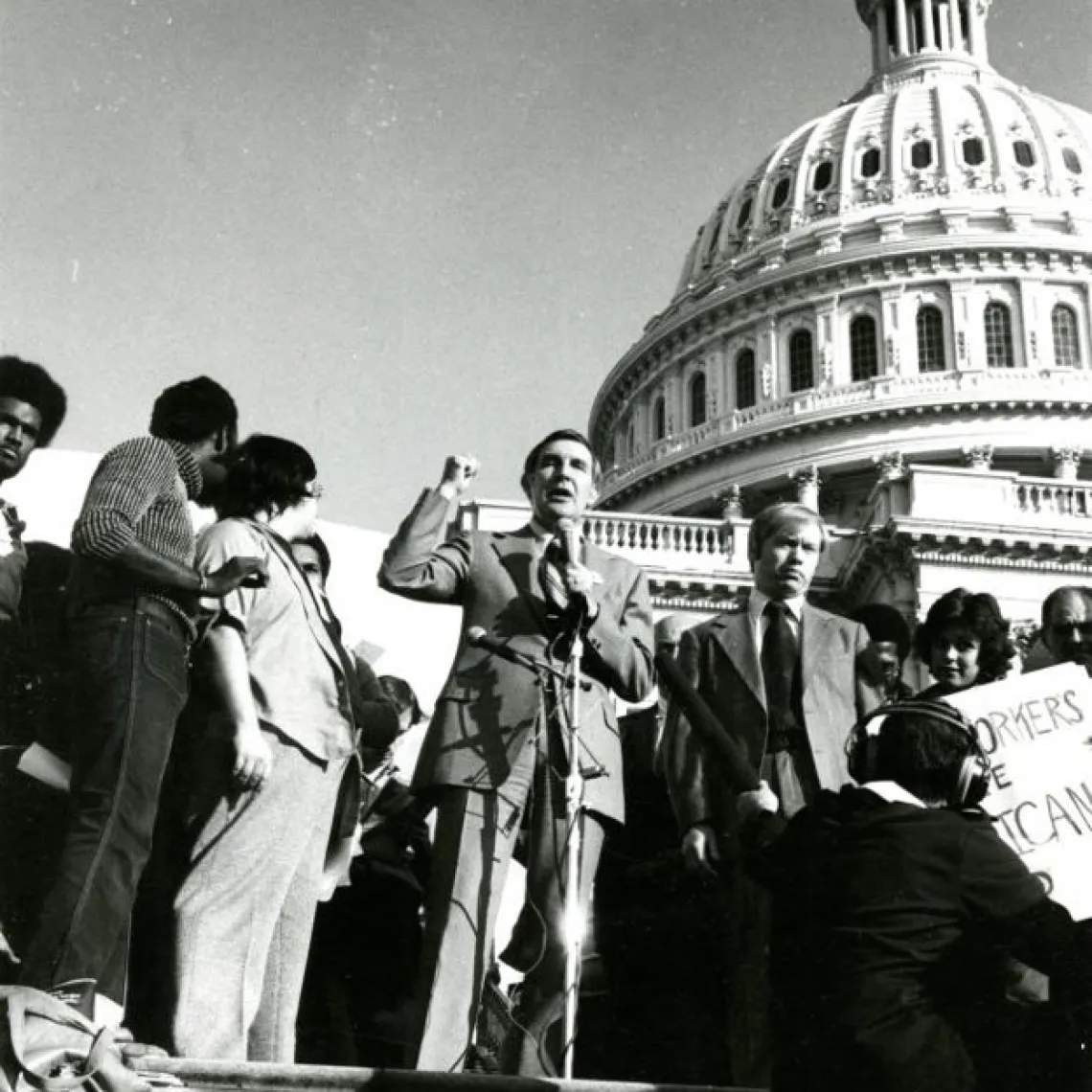
Udall campaigned for the Democratic Party presidential nomination in 22 primaries, finishing second in seven. Here he speaks to voters from the steps of Congress.
UArizona Special Collections
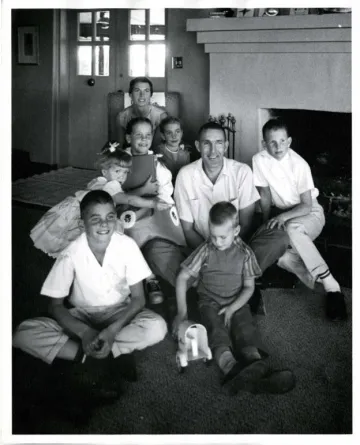
Morris K. Udall and family at the Udall home, 1961. From top: Pat (mother), Bambie (Anne) right of Pat, Dodie (Judith) holding book, Mo Udall, Randy, Kathy, Mark, and Brad. Anne Udall, remembers her father Mo. Courtesy UArizona Special Collections.
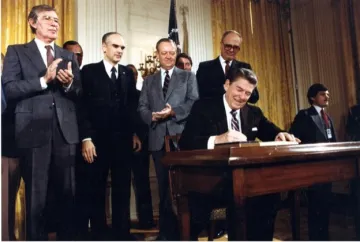
“Nuclear Waste Management Policy Act passed by Congress and signed by President Reagan, 1982.”
UArizona Special Collections.
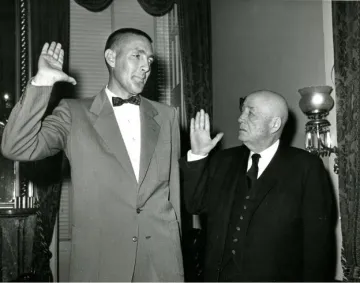
“Udall sworn in by Speaker of the House Sam Rayburn.”
UArizona Special Collections.
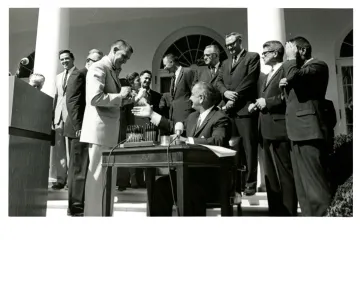
“Morris K. Udall at the signing of the Wilderness Bill, 1964.”
UArizona Library Special Collections.
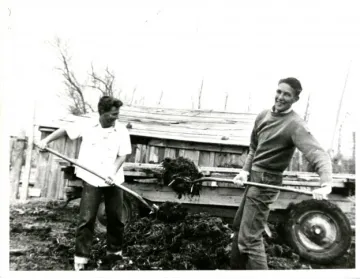
Young Morris K. Udall (right) and his brother Stewart L. Udall (left) at work on the farm in St. Johns, AZ, 1939.
UArizona Library Special Collections.
More than a dozen speakers came together on April 28, 2022, to remember the life of the late congressman Morris “Mo” King Udall. Hosted at the award-winning Environmental and Natural Resources 2 (ENR2) Building on the campus of the University of Arizona, the commemorative event was organized by the University of Arizona’s Udall Center for Studies in Public Policy, with support by the federal Morris K. Udall and Stewart L. Udall Foundation (“Udall Foundation”). Planned for the centennial of Mo Udall’s birth, the event and program gathered speakers from across the country and several Indigenous nations to share their insights and to celebrate the life of an exceptional statesman and servant to the community. The event proved to be much more than just a memorial of a politician from a by-gone-era. It was a gathering of old friends and family that once knew the man. This was a day that shined some light on the intricacies of a person worth remembering: the results of the life’s work of a widely respected servant of the American Southwest.
The diversity of the presenters at the centennial celebration reflected the breadth of Mo Udall’s legacy. When they recalled Mo, many presenters remarked on his earnest nature and charming wit. They offered a canvas of memories and anecdotes about Udall, each bringing personal views about his life and legacy. No matter what perspective the speakers and panelists spoke from, they connected through the central heuristics and allegories they recounted.
During the two panels and five keynote speeches delivered at the celebration, spectators enjoyed a series of humorous stories, tales of personal encounters, and broad analyses of Mo Udall’s work. Many presenters remembered the man through his humor, passion, and wisdom, but all explained why his accomplishments have remained so noteworthy and influential. The foregoing digest documents some of the key points of the day.
Centennial Commemoration
Hosted by the Udall Center for Studies in Public Policy, the Udall Foundation, and the University of Arizona Libraries Special Collections Department, the April 2022 Centennial Anniversary event invited in-person attendees to view a display of artifacts from Udall’s life curated by UArizona archivist Steve Hussman and drawn from the extensive collection housed at Special Collections.
Amid the welcoming, open-air, eco-design setting of the ENR2 Building, attendees enjoyed welcoming remarks, keynote talks, and panel presentations featuring members of the Ak-Chin community, Pascua-Yaqui Tribe, and Tohono O’odham Nation, University of Arizona faculty, along with presentations and comments by some of Udall’s coworkers, family members, and friends.
Introductory speeches were given by University of Arizona President Robert C. Robbins and Elizabeth “Betsy” Cantwell, Senior Vice President for Research and Innovation. Comparing Mo’s older brother Stewart’s impressive resumé of accomplishments in context, Robbins talked about the historic connection between UArizona and Mo, his brother Stewart, and the entire Udall Family. He detailed how that relationship has been sustained and enhanced by the creation of the Udall Center for Studies in Public Policy and the Udall Foundation.
In her introduction of Anne Udall, Cantwell offered comments that elided with Robbins’ remarks on the dynamic between the Udalls and UArizona, one that remains beneficial to the academic community. Joan Timeche, executive director of the Udall Center’s Native Nations Institute, offered introductory remarks for the first keynote speech.
Eric Eberhard, a distinguished attorney and past Chair of the Udall Foundation Board of Trustees, and John Leshy, a former Solicitor for the U.S. Dept. of the Interior, each gave broadly informative and finely tailored keynote talks relating Mo Udall’s significant policy contributions that ensured the preservation of millions of acres of federal land across the United States. Eberhard reflected on Mo Udall’s many achievements, his purpose as a politician, and his impact on hundreds of American Indian tribes and communities. His speech recalled how Udall “cut his teeth” as a public servant in Congress starting in 1961. He went on to recount his position against the Vietnam War in 1967 and his sustained efforts as a congressional whip starting in 1965. With Udall’s help, several pieces of critical legislation were ratified: the Wilderness Act of 1964, which set aside millions of acres of land for preservation; the Archeological Resources Protection Act of 1969, which preserved sacred remains and sites; the Endangered Species Act PL-93205, 1974); and Public Law-91-190, the National Environmental Policy Act of 1969/70. For Eberhard, Udall’s legacy lives on in the laws he drafted and in the numbers behind his political achievements. Losing with grace became part of Udall’s signature, especially after his presidential bid in 1976, yet it was loss that also made “second place Mo” a successful politician who sponsored or cosponsored 2,766 bills and enacted 184 pieces of legislation while in office. While Udall may have lost more than he won, Eberhard revealed that a good portion of Udall’s impact is symbolic—as well as physical from Point Udall in Guam in the Pacific to Point Udall in the Virgin Islands.
UArizona Regents’ Law Professor Rebecca Tsosie spoke about Udall’s enduring commitments to American Indian communities. She identified and spoke passionately about equity struggles that continue to pose challenges. Professor Tsosie summarized Udall’s substantial commitment to and efforts on behalf of Indigenous communities across the nation. Her presentation recalled Udall’s intricate working knowledge of the Diné and other Tribal communities in the Southwest, which informed his career-long advocacy. For Tsosie, Udall’s career ranged far and wide beyond Arizona and the Diné Nation. But in the Southwest, his achievements have special meaning, for her as a woman of Yaqui descent, and for Diné who recognize that policymakers have continued to build upon the political and ecological foundation laid by Mo Udall. Indeed, the mechanisms that policymakers have used to achieve greater equity between tribes and the federal government were largely predicated upon several laws that Udall had helped enact. While the work for social and environmental justice that Udall helped set in motion remains incomplete, Tsosie recognized that Mo Udall sought to enhance the lives of as many people in the Southwest as humanly possible.
Tsosie’s powerful keynote talk echoed and expanded Eberhard’s remarks, but it also prepared the audience for the first panel discussion concerning Udall’s meaningful impact in American Indian communities in the Southwest. The panel was moderated by Tadd Johnson, Director of American Indian Tribal Nations Relations at the University of Minnesota and a trustee of the Udall Foundation. Entitled “Mo Udall’s Efforts on Behalf of Tribes and Indigenous Communities in Arizona and the West,” the session featured a vibrant discussion of Udall by Frank Ducheneaux, a close associate of Mo Udall; Peter Yucupicio, Chairman of the Pascua Yaqui Tribe; Delia Carlyle, a member of the Ak-Chin Indian Community Tribal Council; and Alex Skibine, a professor at the S.J. Quinney College of Law at the University of Utah. Ducheneaux, Yucupicio, Carlyle, and Skibine each recounted what they saw as the local impact of Udall’s efforts. Noting her Uncle Wilbur, Carlyle discussed Udall’s efforts to reform the Indian Organization Act of 1934 and to address the water shortages that plagued her community through Public Law 95328. Skibine argued that Udall’s success drew from his recognition that past Termination-Era policies were misguided. Skibine noted that Udall was willing to “go to bat” for tribal communities to achieve the political protectionism that his constituents required in the Southwest. According to him, Udall’s sustained efforts resulted in legislative reforms such as amendments to the Indian Reorganization Act of 1934 that allowed the Secretary of the Interior to take lands into trust for Native Nations.
John Leshy’s keynote speech provided useful context, meaning, and shape to the character of Mo’s commitment to environmental justice. He reviewed the vast impact Udall had on the landscape by discussing the modernization of public land policies that occurred during the presidencies of Jimmy Carter and Ronald Reagan. Through an historical lens, looking at events like the fuel crisis of 1979, Leshy remembered Udall’s masterful efforts to shore up millions of acres of public lands that were eventually placed into federal protection. Leshy recounted how Udall never let his sometimes-prickly relationship with President Carter stymie political progress. For instance, passage of the Alaska National Interest Lands Conservation Act (ANILCA) resulted in 100 million acres of Alaskan land being placed under federal protection. This occurred in part because of Udall’s successful political maneuvering. While Udall was actively engaged in efforts to protect the environment during his career, he was successful, according to Leshy, because he aptly traversed a changing political landscape that demanded the development of new consensus from an increasingly polarized political theatre. Taken in concert, the panelists and keynote speakers confirmed the breadth of work that Udall initiated in various American Indian communities.
The second panel, “Mo Udall’s Legacy of Inspiring Future Public Servants in Arizona and the Southwest,” turned to the topic of Udall’s life as a family man, politician, philosopher, and mentor. The session was moderated by Udall Center Director Andrea Gerlak, and panelists included Frank Felix, a former Mo Udall intern, Tadd Johnson, and Bruce Wright, a former Mo Udall chief of staff. Wright reflected on his rapid transition from public works to politics when in the early 1980s, he went from working as a management analyst with the City of Tucson to becoming Udall’s campaign director. Wright reflected fondly on his time as Udall’s chief of staff and on the lessons he learned from his former boss, including the value of multi-generation alliances and a life lived in public service. In Wright and Felix’s recollections, Udall often took pains to provide opportunities for those he felt deserved them. For those who worked closely with him, Udall’s leadership elicited an emotional response that, Wright noted, became the cornerstone of his political career.
Anne Udall, daughter of the late congressman, gratefully recalled her father through a heuristic exploration of his life. Anne used her father’s personal reflections and journals as a guide to an informal talk about the philosophical and ethical underpinnings of Mo’s life and career. Recalling several well-worn family tales, she explained that at least in part, it was his upbringing in the LDS Church and the early commitments to service he made there as a child that rendered him a well-practiced public servant in his later years. Overall, her recollection suggested the “good, the bad, and the ugly” of Mo Udall’s life and career in service. Her memory of him ranged from him as a devoted father and family man to a Chivas Regal-drinking Washington dealmaker. In short, she found Mo Udall a remarkably complex person with very human tendencies. At the close of her keynote speech, she told the audience of her own optimism “beyond the scope of reason,” and offered a memorable tenet from her father’s repertoire: “Being right means you will lose a lot more than you will win.”
Reception
The concluding moments of this memorable day were held outdoors, while guests enjoyed the approach of dusk with light refreshments and hors d'oeuvres. Warm welcome remarks were delivered by Shan Sutton, Dean of UArizona Libraries, and by Veronica Reyes-Escudero, Head of Special Collections at the UArizona Library. Sutton and Reyes-Escudero each drew upon their own experiences working with the Udalls and the Udall records housed at UArizona’s Special Collections. Relaying their gratitude for benefits received from the long-standing partnership that exists between UArizona, the Udall Family, the Udall Foundation, and the Udall Center for Studies in Public Policy, their remarks reinforced the day’s purpose while setting the tone for Mark Udall’s personal closing remarks.
To conclude the event, Mark Udall, former Colorado Senator from 2009-2015 and son of the late congressman, carried the family banner from his sister Anne Udall’s earlier remarks to deliver the final keynote in ENR2’s courtyard. He echoed Anne concerning the wide sweep of impacts, not just those Udall had upon his family, but on the community at large. After drawing on a few tales that included what it was like at the Udall family dinner table while growing up, Mark Udall reasoned that it was his father’s combined experiences—the hardships he faced during the Great Depression, his awareness of the cycles of nature, and even his youthful spirit of rebellion—that styled Mo’s monumental persona. Like his sister, Udall credited their father for instilling the values that they each hold dear. The larger-than-life portrait they painted was emblematic of the vast scope and significance of Mo Udall’s legacy.
This report was made possible with funding provided by The University of Arizona’s Udall Center for Studies in Public Policy. Special thanks to the Udall Center for their technical and editorial guidance. I’m particularly indebted to Robert Varady, Andrea Gerlak, and Molli Bryson, who patiently provided their time and leadership throughout this effort. Steve Hussman of Special Collections at The University of Arizona Libraries generously helped identify and provided salient historical photographs. Lastly, a heartfelt thanks to all participants who came to the event in April 2022, for through the collective sharing of memories about Mo Udall, this day was memorable.

